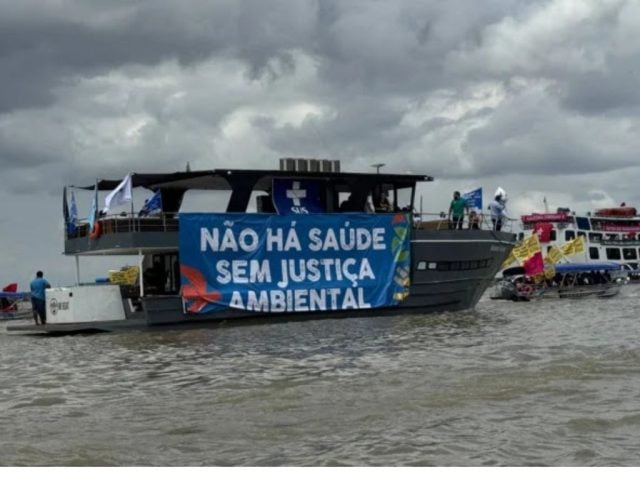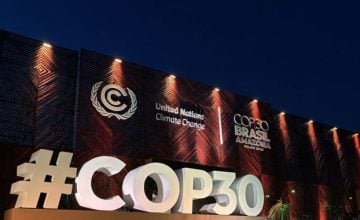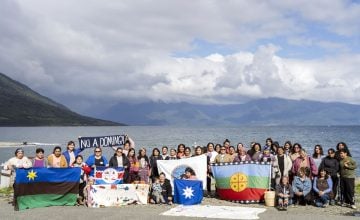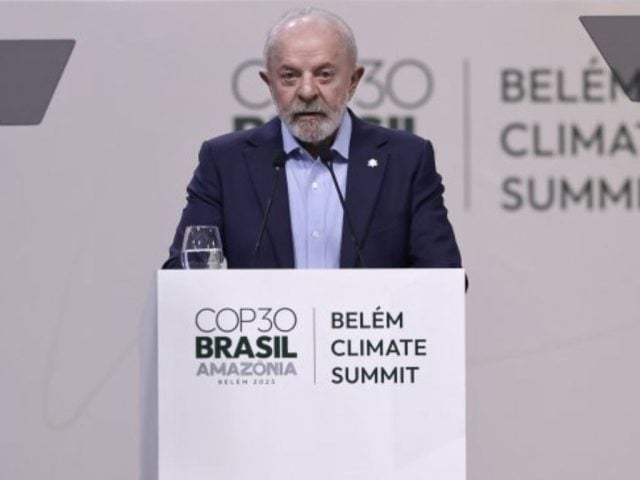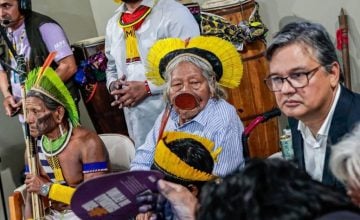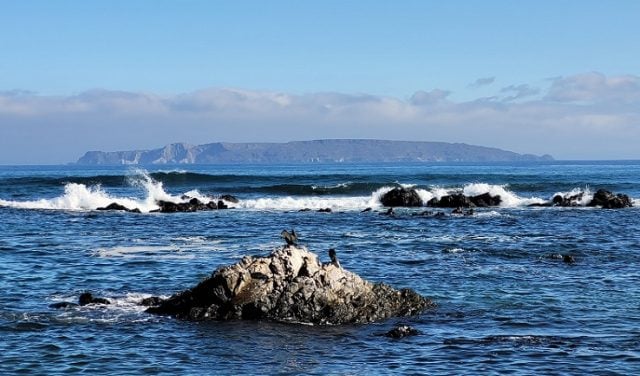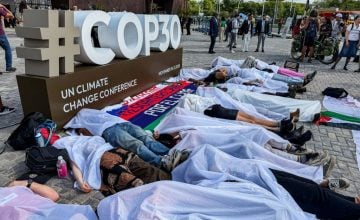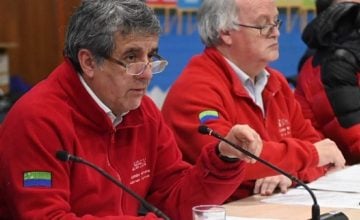Original article: Salmoneras, Sofofa y pueblos originarios en el mismo pasillo: Rodrigo Andrade revela la trastienda chilena de la COP 30
A fire, protests, the participation of Indigenous communities, and the presence of oil lobbyists alongside the Society of Industrial Promotion (Sofofa) create a complex landscape for the 30th United Nations Climate Change Conference (COP 30), currently taking place in the Amazon city of Belém, capital of Pará, Brazil. This was revealed on Friday by Rodrigo Andrade, an academic and ecosocialist activist, during an interview on the La Mañanera program hosted by Javier Pineda Olcay, director of El Ciudadano.
Andrade, an eyewitness to the events, described a summit where the urgency for climate action clashes with economic interests and slow international bureaucracy.
The Fire That Interrupted COP 30
In the interview, the engineer referred to the fire reported on Thursday at 2:00 PM (local time) in the main venue hosting COP30 negotiations, prompting a precautionary evacuation of delegates, ministers, and technical teams.
The author and speaker, who is currently in Belém, indicated that the fire started in one of the tents in the so-called Blue Zone, the area managed by the United Nations that houses negotiation rooms and national pavilions.
«The fire caps a series of very particular situations at COP-30. Yesterday at exactly 2 PM, it began within the COP30 venue. We saw people running, we saw young individuals hurriedly fleeing, and everyone was quite surprised by such a situation, given that the Blue Zone of COP-30 is in the negotiation area, filled with government representatives,» he recounted.
He noted that confirmation of the incident came informally: «At one point, as these runners began to multiply, someone nearby raised a cell phone and showed a video of a fire, and indeed, it was a fire in the COP-30 stands area. Given the vastness of the venue, it’s impossible to tell if such a situation is real or not. So, upon validating with those images that it was indeed real, people quickly started to exit through emergency exits.»
Regarding the fire’s origin, the academic dismissed claims of an attack, attributing it to technical failures. «I have not heard anyone suggest anything akin to an attack. Moreover, the location of the fire is where the stands are located, which is the most crowded area and has multiple power sources, with high electrical saturation. In previous days, there have been power outages. We’re talking about a facility that can host 100,000 people, meaning it has all kinds of services, from cafeterias to whatever one might need,» he stated.
COP: Three Decades of Negotiations and a Stalled Transition
At this conference, representatives from over 190 countries aim to define strategies to keep the Paris Agreement’s goals alive, discussing roadmaps for energy transition, the phase-out of fossil fuels, and climate adaptation measures.
Reflecting on the origin and significance of this event, Andrade recalled that «since the Rio Summit in 1992, a scientific-political meeting has been held, notably in Brazil. At that time, a connection of interests was recognized between science, which had been warning since the early 1970s with the Limits to Growth report, and the political leaders of the world, who took on the task of addressing this increasingly urgent issue, designing a roadmap for negotiations.»
He indicated that from this context emerged three conventions: «the framework convention on climate change, which corresponds to COP 30; a second convention on biodiversity, which was successfully held last year in Colombia; and a third, which addresses desertification.»
Regarding the Paris Agreement of 2015, a pivotal moment in the process, Andrade was emphatic: «We are completing 10 years, a decade in which countries of the world committed to reducing their greenhouse gas emissions through a just ecological transition. Unfortunately, I believe that beyond the political commitment’s relevance and bringing world powers like the U.S. and China to the negotiating table, that transition has not occurred. Greenhouse gas emissions have continued to rise year after year.»
The Financing That Is Still Lacking
According to the ecosocialist activist, the major challenge of this COP is to move from plans to action, which critically depends on financing.
«The issue now, which is the significant difficulty and challenge this COP is facing, is that all work plans, all plans to progress towards this just ecological transition are already outlined. Science has spoken, countries have taken three decades to agree on this, and this is the moment to act on climate, which means those countries that committed to providing resources must step up with their financing.»
He also referenced the multi-billion-dollar debt owed by developed countries.
«Last year, remember, at the COP 29 in Azerbaijan, in Baku, it was required to raise 365 billion dollars, which is the commitment from wealthier countries. Only 200 million dollars were actually put on the table. That’s a lot of money, 200 million dollars, but it’s nowhere near what science advises; it’s less than 1%,» he emphasized.
He pointed to the G7 and the United States under the extreme right’s Donald Trump as the main culprits in this failure.
«To put it plainly, the G7 or G20, which has broader responsibilities for wealthy countries, particularly Europe and the United States—everyone knows that today with President Donald Trump, the U.S. is withdrawing from the Paris Agreement,» he remarked.
He criticized the Republican mogul, saying, «He isn’t even putting up the money. He isn’t participating in meetings, rather downplaying their worth and showing disinterest.»
«So we are in a big problem, and new leaders need to emerge; I believe these new leads and actors mainly come from China,» he argued.
Behind the Scenes in Chile: Sofofa, Salmon Farms, and Diplomacy in the Same Halls
When asked whether Chile is recognized as the «first ecological state in the world,» Andrade was direct: «That does not exist, no. I believe that is a funny political slogan, which is also unrealistic. If it did exist, it would be Costa Rica, Uruguay, or other countries relying 100% on unconventional renewable energy. Unfortunately, that is not the case for our country,» he stated.
Regarding the Chilean delegation, he highlighted its technical role and unveiled its unusual composition that includes the business sector.
«The official delegation includes Minister of Environment Maisa Rojas as head, the Division of Environmental Climate Change and Ocean Affairs from the Foreign Ministry, which I would say is the great responsible for Chile’s significant position in this negotiation space. There is a group of experts who fully understand the importance of our small, remote country being a key player in these discussions,» he mentioned.
«There is also a significant presence of civil society members along with people from the business world, but the head members of delegation are those,» he noted.
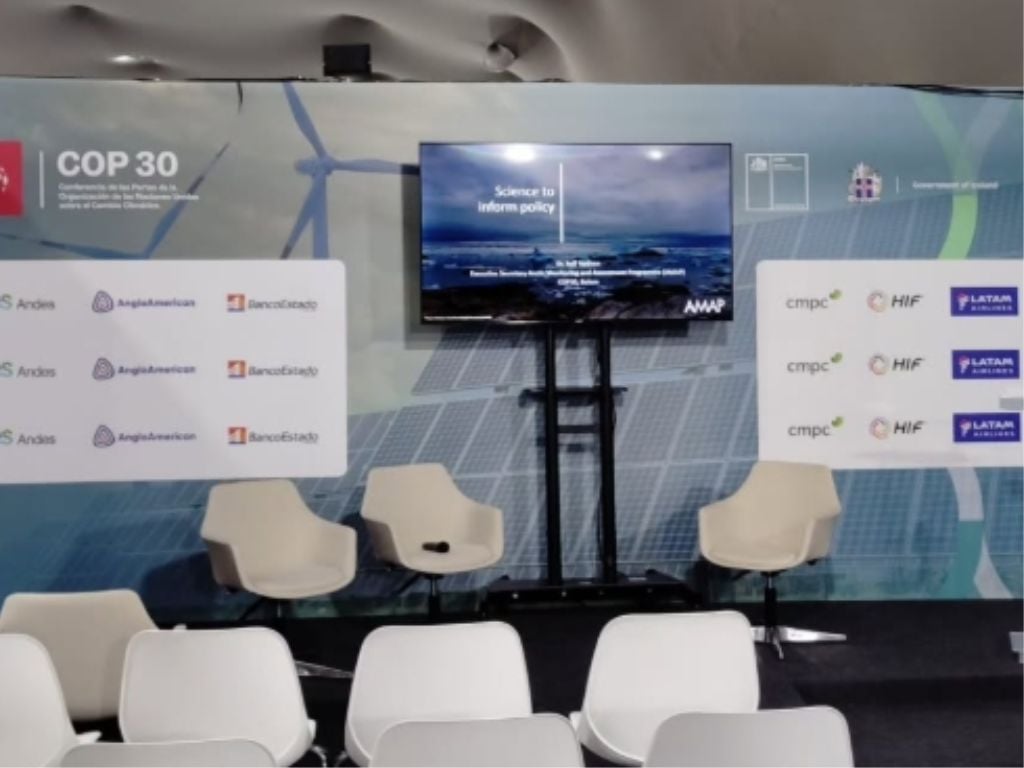
The academic mentioned the controversy surrounding the official Chilean pavilion at COP 30, which has faced serious criticism due to its corporate financing.
It is worth noting that Lucio Cuenca, director of the Latin American Observatory of Environmental Conflicts (OLCA), accused that this space is financed by domestic and transnational private companies linked to socio-environmental conflicts, labeling this action as «greenwashing» and a «capture» of climate politics by the private sector.
Through a message on social media, he indicated that the cover of the official program and graphics from the Chilean Government’s conference room at COP30 show the logos of sponsoring companies like Latam Airlines, CMPC (Matte Group), HIF (synthetic fuels), AngloAmerican, Teck, Aes Andes, and BancoEstado.
He further questioned that the program also includes business groups such as United for Climate Action, Natura, Danone, Minera Vale, Aguas Andinas, Forestal Arauco, the World Bank, and BNP Paribas.
«Moreover, there has been some controversy in Chilean news regarding the financing of the national stand, which primarily comes from Sofofa and the business guilds. Historically, Chile has been open to participation from both civil society and the business sector,» Rodrigo Andrade noted.
«Thus, one finds oneself in the hall with representatives of controversial salmon farming interest groups within the country, but they are afforded space here to dialogue and gain a more nuanced understanding of the discussions that unfold in the long term,» he concluded.
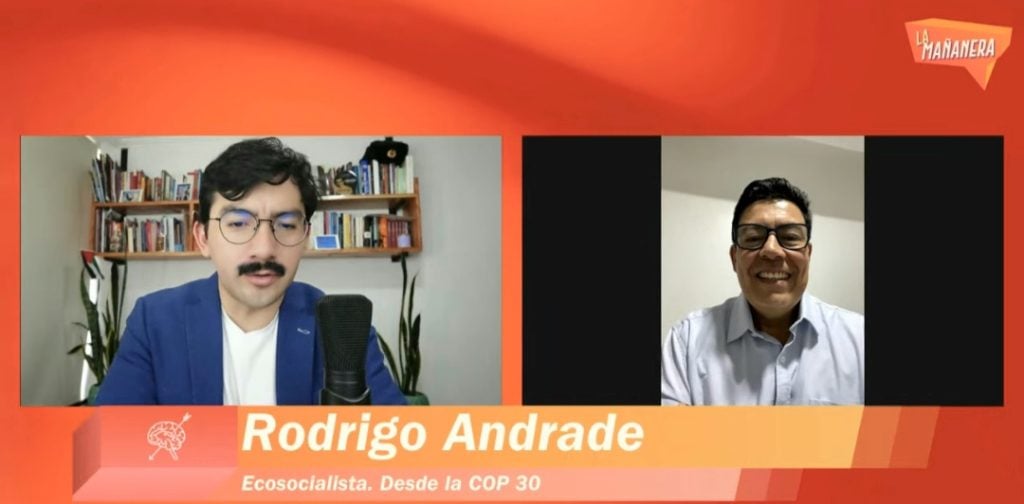
Protests, Oil Lobbying, and Recognition of Indigenous Peoples
In his interview with La Mañanera, Andrade depicted a scenario of stark contrasts and tensions within the context of COP 30.
«I think something interesting has occurred at this summit, particularly aside from this fire and the torrential rains here in Pará, there have been numerous protests. These protests are not necessarily against (Luiz Inácio) Lula da Silva’s government; they are happening because some Brazilian states governed by the opposition want to develop oil projects in the Amazon, opposing everything being discussed globally, in the style of Trump or (Javier) Milei, alongside many protests from Indigenous peoples,» he explained.
Amidst this scenario, the academic highlighted an unprecedented recognition of ancestral communities.
«The United Nations, with considerable capacity and political savvy, made a recognition the day before yesterday of the Indigenous peoples and their importance for nature conservation. Numerous scientific studies confirm that where Indigenous peoples are active and thriving, there is greater protection for nature, and that is something that has never happened before,» he pointed out.
However, he also emphasized the magnitude of the competing interests at play, where the fossil fuel industry’s presence contrasts starkly with environmental defenders.
«We are witnessing a summit where one in 25 attendees are lobbyists from the global oil industry. There is a significant attendance not only from environmentalists but also from the counterparty. The economic interests being debated here are of utmost importance, which is the beauty of these spaces that allow for face-to-face discussions with major players,» he said.
Next, you can watch the full broadcast of La Mañanera from this Friday, November 21:

